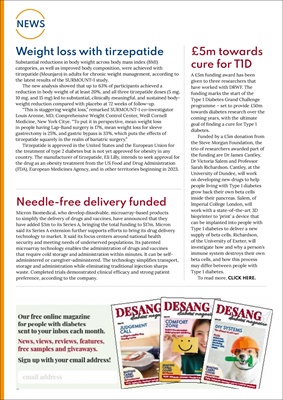
6
NEWS
Weight loss with tirzepatide
Substantial reductions in body weight across body mass index (BMI)
categories, as well as improved body composition, were achieved with
tirzepatide (Mounjaro) in adults for chronic weight management, according to
the latest results of the SURMOUNT-1 study.
The new analysis showed that up to 63% of participants achieved a
reduction in body weight of at least 20%, and all three tirzepatide doses (5 mg,
10 mg, and 15 mg) led to substantial, clinically meaningful, and sustained bodyweight
reduction compared with placebo at 72 weeks of follow-up.
"This is staggering weight loss," remarked SURMOUNT-1 co-investigator
Louis Aronne, MD, Comprehensive Weight Control Center, Weill Cornell
Medicine, New York Citye. "To put it in perspective, mean weight loss
in people having Lap-Band surgery is 17%, mean weight loss for sleeve
gastrectomy is 25%, and gastric bypass is 33%, which puts the effects of
tirzepatide squarely in the realm of bariatric surgery."
Tirzepatide is approved in the United States and the European Union for
the treatment of type 2 diabetes but is not yet approved for obesity in any
country. The manufacturer of tirzepatide, Eli Lilly, intends to seek approval for
the drug as an obesity treatment from the US Food and Drug Administration
(FDA), European Medicines Agency, and in other territories beginning in 2023.
To read more, CLICK HERE.
Needle-free delivery funded
Micron Biomedical, who develop dissolvable, microarray-based products
to simplify the delivery of drugs and vaccines, have announced that they
have added $3m to its Series A, bringing the total funding to $17m. Micron
said its Series A extension further supports efforts to bring its drug delivery
technology to market. It said its focus centers around national health
security and meeting needs of underserved populations. Its patented
microarray technology enables the administration of drugs and vaccines
that require cold storage and administration within minutes. It can be selfadministered
or caregiver-administered. The technology simplifies transport,
storage and administration while eliminating traditional injection sharps
waste. Completed trials demonstrated clinical efficacy and strong patient
preference, according to the company.
To read more, CLICK HERE.
Non-sugar sweeteners a 'no no'
A new guideline from the World
Health Organization (WHO) on nonsugar sweeteners
(NSSs) recommends
not using them to control weight or
reduce the risk of diabetes, heart
disease or cancer. These sweeteners
include aspartame, acesulfame K,
advantame, saccharine, sucralose,
stevia, and stevia derivatives.
The recommendation is based on
the findings of a systematic review
that collected data from 283 studies
in adults, children, pregnant women,
and mixed populations.
The survey findings suggested
that use of NSSs does not confer
any long-term benefit in reducing
body fat in adults or children and
also suggested that the long-term
use of NSSs may have potential
undesirable effects, such as the
increased risk of type 2 diabetes,
cardiovascular diseases, and allcause
mortality in adults. Indeed,
results from case-control studies
suggest an association between
saccharine intake and bladder
cancer (albeit very low certainty
evidence). Finally, results for
pregnant women suggest that
higher NSS intake is associated with
increased risk for preterm birth (low
certainty evidence) and possibly
adiposity in offspring (very low
certainty evidence).
To read more, CLICK HERE.
£5m towards
cure for T1D
A £5m funding award has been
given to three researchers that
have worked with DRWF. The
funding marks the start of the
Type 1 Diabetes Grand Challenge
programme - set to provide £50m
towards diabetes research over the
coming years, with the ultimate
goal of finding a cure for Type 1
diabetes.
Funded by a £5m donation from
the Steve Morgan Foundation, the
trio of researchers awarded part of
the funding are Dr James Cantley,
Dr Victoria Salem and Professor
Sarah Richardson. Cantley, at the
University of Dundee, will work
on developing new drugs to help
people living with Type 1 diabetes
grow back their own beta cells
inside their pancreas. Salem, of
Imperial College London, will
work with a state-of-the-art 3D
bioprinter to 'print' a device that
can be implanted into people with
Type 1 diabetes to deliver a new
supply of beta cells. Richardson,
of the University of Exeter, will
investigate how and why a person's
immune system destroys their own
beta cells, and how this process
may differ between people with
Type 1 diabetes.
To read more, CLICK HERE.